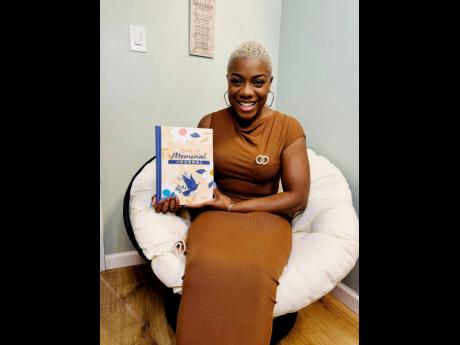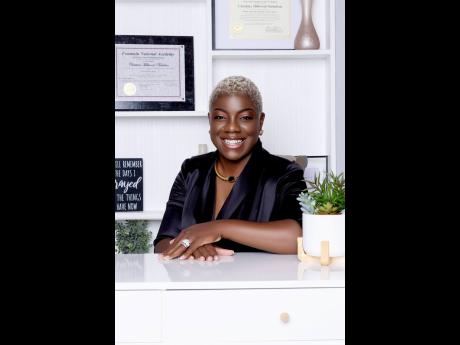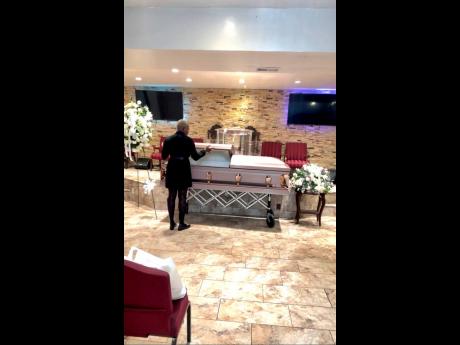Christina Millwood-Nicholson lives for the dead
Mortician keen to lay deceased to rest with respect and pride
The dead and dearly departed are in good hands. This according to licensed funeral director Christina Millwood-Nicholson.
The 31-year-old Millwood-Nicholson, who is from Manchester and now resides in New York, owns Unique Mortuary Supplies, located in Portmore, St Catherine. She is focused on providing dignified, elegant, and compassionate service, which will allow the deceased to be laid to rest with respect and pride.
In the industry, she is considered a Jill of all trades and master of many. She is an embalmer, Hollywood-certified airbrush mortuary artist, reconstructive specialist, and a forensic pathologist assistant.
Millwood-Nicholson, in a Gleaner interview, said she was passionate about handling the dead.
“When I say this to people, it may come off a little bit crazy, but I love, eat, sleep, breathe, and walk funeral service. I don’t know how to do anything else. I was a lab technician. I have a certificate in culinary arts and one in childcare. I tried many other things, but nothing sat well with me,” she shared.
MONEY NOT THE FOCUS
As lucrative as the funeral industry can be, for the young funeral director, money is not the main focus.
“I love being a funeral director to the point where I would do it without being paid. I dedicate my everything to it. I wake up with a joy in my heart every day to approach the world as a funeral director,” she said.
“Once I got into the industry, I wanted to become an embalmer. This because I wanted to be physical with the body. I feel that there are a lot of things that happen that I can make a difference with.”
Millwood-Nicholson’s love for the dead was sparked at an early age.
“My mother has been a police officer for over 20 years. So I grew up in the police station, going on crime scenes with her, sitting in the police car and just watching. I kind of grew a love for death at a younger age,” she said.
In addition to that, her grandmother generally came home and discussed how the dead looked after attending funerals.
“My cousin tragically passed away, and when I saw how he looked, I thought there were things that could have been done better, so I said I would definitely want to get into this. So that is where I grew my passion from,” she noted.
After high school, her first-hand experience of working with the dead started as a volunteer at the Mandeville morgue. She then migrated to the United States, where she earned a degree in Occupational Studies in Mortuary Science.
In spite of her great love of being a funeral director, there was negative feedback from her family and friends.
In fact, she admitted that some felt she was crazy and questioned her choice. However, they eventually warmed to the idea.
“Trust me, they gave me a warm time. At one point, my father didn’t want to eat from me. He didn’t want to take anything out of my hands. After realising how I love what I do and how I am involved and my passion was overwhelming, they got into the groove. I can’t call them when I am handling a body in the morgue,” she stated.
NO FEAR
Stories of strange things happening in morgues have been on the tongues of many, but Millwood-Nicholson isn’t fearful of any.
“I have never been scared in the morgue. Little things will happen, but they are not unusual to me. When someone dies and I go to remove them from their homes, rigor mortis will set in. So you will see a little twitch in the finger or you will hear a little gurgling in the throat. It is the process of dying,” said Millwood-Nicholson.
In the meantime, Millwood-Nicholson has been travelling to different countries, educating people about embalming and restorative art.
Eager to provide more details about her passion, she believes that she is the mediator between the dead and their family.
“If a person passes away tragically and the family will want a closed-casket funeral, I take pride in making the body viewable. I will take the body, pull the body down, embalm it, and try to get it back to an appearance that families can have a viewing and not close the casket,” Millwood-Nicholson told The Gleaner.
“I went to Missouri and met with one of the best reconstructive technicians and learnt how to reconstruct bodies. If the face, ear, or piece of the nose is missing, I know how to repair this body back to a viewable sight,” she added.
Some of Millwood-Nicholson’s most tragic cases are from train accidents.
RISK FACTORS
“I have seen bodies where the parts were in individual bags. I had to embalm and put this body back together. When they are run over by trains, they are crushed into pieces. No matter how tragic it is, I have to pull up my big socks and do my job as a mortician for the family – pregnant mothers and rape victims, just to name a few. As humans, we will get emotional but I have a family to serve,” she added.
In delivering that service, Millwood-Nicholson stressed some risk factors funeral directors face daily.
“Because we have a passion for this, we tend to expose ourselves so we can get our job done. All embalming fluids that we use have formaldehyde, and it is cancerous,” she said.
“Persons known for using it for years and exposed to the fumes have cancer of the throat, tongue, stomach, nose, and mouth.
“In Jamaica, they use the raw one, so they are highly exposed,” she added.
The funeral director said that as curious as the job may seem, it’s not for everybody.
“A lot of times what people see is the body in the casket and the makeup and want to be a mortician. That’s not the reality. I have been to houses where the body has been there for days, especially in the summer when it is hot. Maggots and cockroaches all over,” she explained.
“There are a lot of behind-the-scenes things we deal with. Organs will come in bags or buckets and we have to handle them. We don’t publicise these things, and I think that’s why morticians are not appreciated as they should be.”



